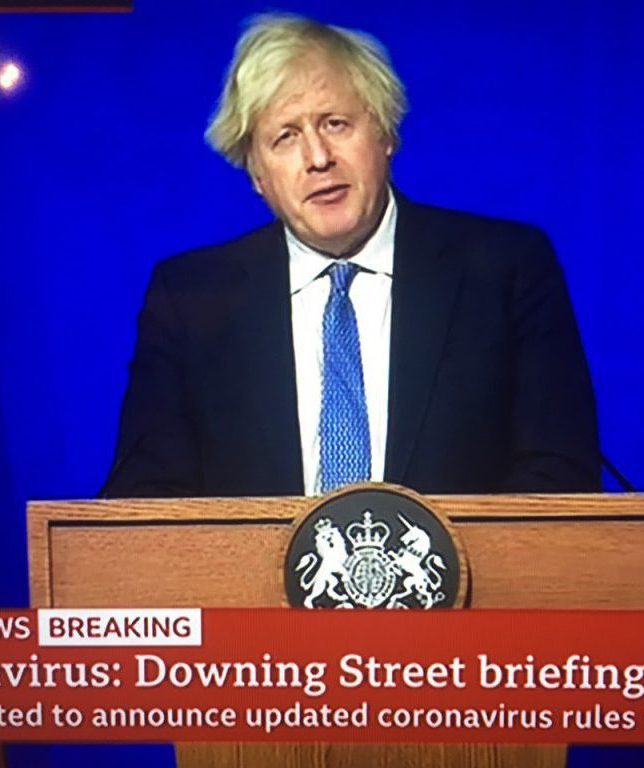Prime Minister Boris Johnson has been fined for breaking covid laws which prevented millions of Britons from seeing their families and friends or visiting dying relatives during covid lockdowns.
A week later on April 19 he appeared in the House of Commons to apologize and all the opposition parties called for him to face an inquiry by the Parliamentary committee on privileges into whether he “misled the house” when he had earlier claimed there were no parties, he didn’t know about any parties, and then that all rules were followed.
His government whips tried to get support to delay its effect by amending that resolution but reversed that attempt 15 minutes before the debate was due to start and allowed a free vote by Tory MPs.
The resolution to send the question of whether Boris Johson lied to the House of Commons passed without even needing a vote when not a single MP opposed it on April 21.
Boris Johnson was 4000 miles away in India on a trade and diplomatic mission.
Johnson now faces the results of three inquiries – by the parliamentary privileges committee, the final report into Partygate by senior civil servant Sue Gray, and possible further fines from police for breaking covid rules by attending gatherings during covid lockdowns.
The fine revealed on April 12 was for attending one of his own birthday celebrations on 19 June 2020 in the cabinet room – and was one of 50 announced so far.
Johnson’s wife Carrie Symonds and Chancellor Rishi Sunak were also fined for breaking the rules at the same event.
The police continue to investigate a pattern of rule breaking at parties and gatherings in Westminster in 2020 and 2021 with the results from inquiries into 10 more events still to come.
A day earlier the group representing organisations across the health care sector accused Johnson’s government of ignoring the continuing threat from covid for ideological reasons.
The NHS Confederation accused the government of having “abandoned any interest” in the pandemic, despite recent infections at high levels, hospital waiting lists for routine surgery at the highest level ever, and increasing pressure on an already overstretched NHS.
“The brutal reality for staff and patients,” said Matthew Taylor chief executive of the NHS Confederation, “is that this Easter in the NHS is as bad as any winter. But instead of the understanding and support NHS staff received during 2020 and 2021, we have a government that seems to want to wash its hands of responsibility for what is occurring in plain sight in local services up and down the country. No.10 has seemingly abandoned any interest in Covid whatsoever.”
Johnson apologised after being fined as did his wife and Sunak.
All four opposition leaders called for Johnson and Sunak to resign with Labour leader Sir Keir Starmer saying the police fines prove they had “broken the law and repeatedly lied to the British public”. He added that it marked the “first time in the history of our country that a prime minister has been found to be in breach of the law”.
Johnson’s leadership remains in jeopardy even as a number of cabinet ministers tried to dismiss the fine as a minor offence and argued it was not a good time to change leaders in the midst of the crisis in Ukraine.
The justice minister in the Lords, Lord Wolfson, resigned with a stinging rebuke to Johnson over “repeated rule breaking and breaches of the criminal law in Downing Street”. He said it was a matter of the Prime Minister’s “own conduct” as well as the “scale” of the lockdown breaches which took place in Downing Street and Whitehall.
Sue Gray’s preliminary report in January into Partygate, restricted due to the police investigation, found “failures of leadership and judgment” in Number 10 and criticised the culture in Johnson’s Downing Street office that allowed social gatherings to take place during lockdown which were “difficult to justify”.
Johnson will also face the results of local elections across the UK on May 5 in which the public may to some extent demonstrate their judgment of his government. Local election results are notoriously difficult to interpret in terms of a national vote but several politicians have pointed out signs of Conservative government concern.
Liberal Democrat leader Ed Davey said the timing of a highly controversial government plan to fly asylum seekers 4000 miles to Rwanda – announced two days after the fines were revealed – was an attempt at a “cynical distraction” from Partygate.
Labour Leader Keir Starmer called it a “desperate announcement by a prime minister who just wants to distract from his own law-breaking”.
Senior Conservatives had similar interpretations – Tobias Ellwood, chair of the parliamentary defence committee, and two former international development ministers Andrew Mitchell and Rory Stewart.
And Nigel Farage suggested the Rwanda plan was an attempt to secure support from right wing anti immigration voters on May 5.
Boris Johnson fined
Boris faces three investigations
Boris and Rishi apologise
NHS Confederation says covid threat ignored
Hospital waiting lists at record high level
Covid infections at record levels
Covid cases – Daily Mail
Covid in the UK
Justice Minister Wolfson resigns
Keir Starmer on Boris Johnson
Sue Gray preliminary report
Partygate – covid, the media, the prime minister
Local elections May 5
Ed Davey says Rwanda asylum plan “cynical distraction”
Keir Starmer – a “desperate distraction”
Tobias Ellwood – plan is a distraction
Rory Stewart – designed “to distract people from Boris Johnson’s troubles”
Andrew Mitchell on Rwanda plan
Nigel Farage on immigration, Rwanda and local elections
YouGov snap poll on Rwanda plan – 42% against, 35% for
Earlier Ipsos Mori poll on attitudes to immigration before Ukraine war
Government Rwanda plan
Widespread criticism of Rwanda plan
Why the Tories are trying to offshore asylum seekers
Hidden agendas








